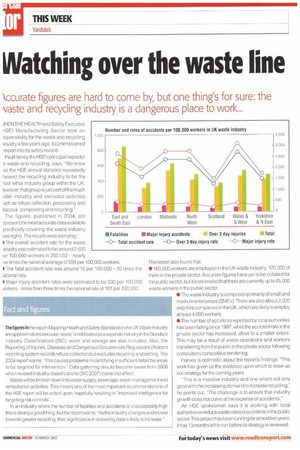Watching over the waste line
Page 24

If you've noticed an error in this article please click here to report it so we can fix it.
\ccurate figures are hard to come by, but one thing's for sure: the vaste and recycling industry is a dangerous place to work...
MENTHE HEALTH and Safety Executive -ISE) Manufacturing Sector took on )sponsibility for the waste and recycling idustry a few years ago, it commissioned report into its safety record.
Paul Harvey, the HSES principal inspector )r waste and recycling, says: "We knew lat the HSE annual statistics repeatedly howed the recycling industry to be the -lost lethal industry group within the UK. lowever, that group is just part of the much rider industry and excluded activities uch as refuse collection, processing and lisposal, composting and recycling."
The figures, published in 2004, still )present the most accurate data available pecifically covering the waste industry see right). The results were worrying:
I The overall accident rate for the waste ustry was estimated lobe around 2,500 ier 100,000 workers in 2001/02 nearly ye times the national average of 559 per 100,000 workers.
The fatal accident rate was around 10 per 100,000 10 times the iational rate.
Major injury accident rates were estimated to be 330 per 100,000 vorkers more than three times the national rate of 101 per 100,000. The report also found that: • 160,000 workers are employed in the UK waste industry, 120,000 of them in the private sector. Accurate figures have yet to be collated for the public sector, but it is estimated that there are currently up to 45,000 waste workers in the public sector.
• The waste industry is composed primarilyof small and medium enterprises (SMEs). There are also about 2,000 skip-hire companies in the UK, which are likely to employ at least 4,000 workers.
• The number of accidents reported by local authorities has been falling since 1997, while the accident rate in the private sector has increased, albeit to a smaller extent. This may be a result of waste operations and workers transferring from the public to the private sector following compulsory competitive tendering.
Harvey is optimistic about the report's findings: "This work has given us the evidence upon which to draw up our strategy for the coming years.
"This is a massive industry and one which will only grow with the increasing demand to increase recycling," he points out. "The challenge is to ensure that industry growth does not come at the expense of accidents."
An HSE spokesman says it is working with local authorities to reduce waste-related accidents in the public sector. This project has been running for almost two years; it has 13 months left to run before its strategy is reviewed.


























































































































































































